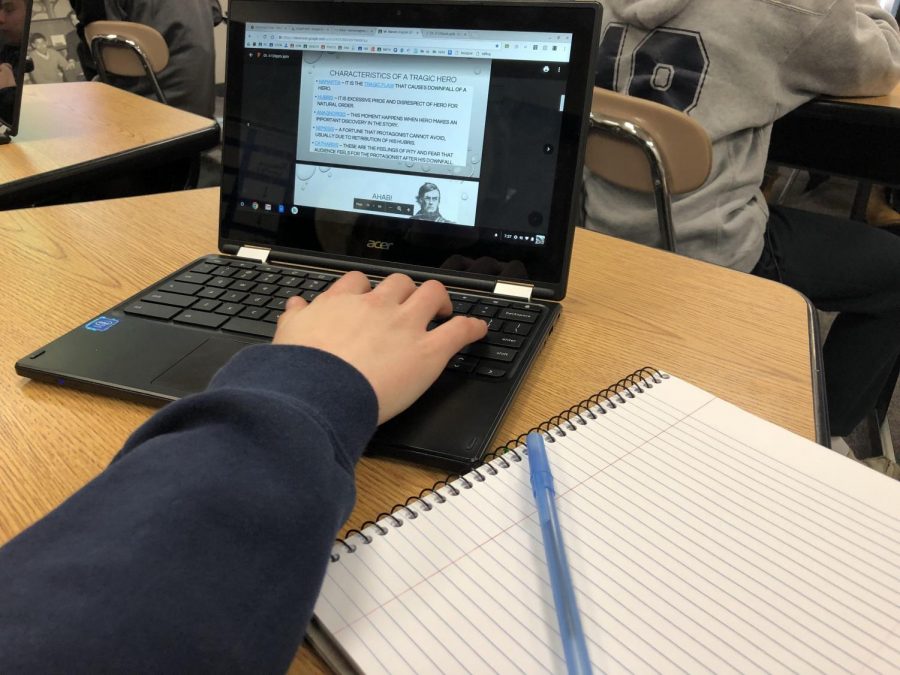EDITORIAL: Is digital notetaking mightier than the pen?
Chrome v. Pen: A North Penn High School student scrolls through an English class power point on Moby-Dick. With an increase in technology in the classroom comes a decrease in hand written note taking. Whether that change is for better or worse is up for debate among educators.
Walk into any classroom at North Penn High School and you are bound to see students taking notes or viewing them on their chromebooks. The recently implemented one-to-one policy at North Penn High School means that more and more students are inclined to use their chromebooks for everyday tasks, including note taking. But this raises the question: how does note-taking on a computer compare to note taking by hand?
A 2014 study conducted by Pam A. Mueller of Princeton University and Daniel M. Oppenheimer of University of California, Los Angeles, helps answer this question. The study, entitled The Pen Is Mightier Than the Keyboard: Advantages of Longhand Over Laptop Note Taking, seeks to find whether note-taking on laptops leads to better retention of information in comparison to note-taking longhand.
In the study, Mueller and Oppenheimer compared the notes of two students at a time. One used a laptop while the other took notes on paper. The students watched the same TED talk to take notes from. After the TED talk, the students were put through a number of rigorous memory tests. Thirty minutes later, the students were asked a series of both “factual-recall questions (e.g., “Approximately how many years ago did the Indus civilization exist?”) and conceptual-application questions (e.g., “How do Japan and Sweden differ in their approaches to equality within their societies?”) about the lecture and completed demographic measures.”
The tests revealed that on factual-recall questions, both note-takers scored equally well. However, on concept-application questions, the laptop note-takers scored significantly worse. This was found to be related to what the notes of each participant contained. When using a laptop, students were much more likely to take longer verbatim notes. Longhand note-takers, in comparison, took shorter notes that were more likely to be in the note-taker’s words.
At North Penn High School, since the implementation of the one-to-one initiative, many teachers have relied more on posting notes on Google Classroom, accessible through the students’ new chrome books. But not every teacher is ready to eschew the use of pen and paper completely.
“I believe in the power of pen and paper. There is such an important processing component to physically writing. You have to think about what’s being said and ask yourself, “What does this actually mean? How am I going to get the important parts of it down in a way that makes sense to me?” explained NPHS English teacher Liz Weizer.
When a student takes notes longhand, he/she must process the information into his/her own words before writing it down. Since it is faster to type than it is to write, when using a laptop a student will simply copy words verbatim from a lecture. This causes that individual not to process the information into his/her own words.
Mueller and Oppenheimer concluded that “laptop use can negatively affect performance on educational assessments, even—or perhaps especially—when the computer is used for its intended function of easier note taking.” So if laptop note-taking negatively affects test performance, why is it becoming more and more prevalent here in the classrooms at North Penn?
Granted, there are many benefits to the Chromebooks. An easy to use laptop for all students, which puts everyone at a tech-level playing field when it comes to the internet, certainly has a positive influence on the students. But when it comes to note-taking, teachers should be advising students to use the classic pen and paper. Not only will the students be more actively engaged in the task at hand, but they will also grasp concepts better, and in turn, score better on tests.
“I thought that perhaps my age had something to do with my affinity for writing notes by hand, but if I give my students the option of a paper version of something to write on versus an electronic version to type on, an overwhelming majority of them want the paper in their hand. I would much prefer to flip pages than scroll through a Doc, write notes in the margins than click on a comment bubble, have a notebook I can pull out of my backpack than a Google Drive floating in the clouds. I think the students prefer that, too. And the research supports better learning through note taking by hand, so why would we take that opportunity away from our students?” Weizer noted.
In 21st century classrooms, it is often difficult to balance technology and traditional learning methods. While it is important to take advantage of what technology has to offer, it should never be assumed that more technology is always better. Sometimes old school is the best school.



Colleen Felder • Apr 5, 2018 at 1:49 pm
Great editorial on a very relevant topic these days. Well written and explored, Doug! I hope our district pays close attention to the educational deficits and changes that are occurring due to increased use of screens.